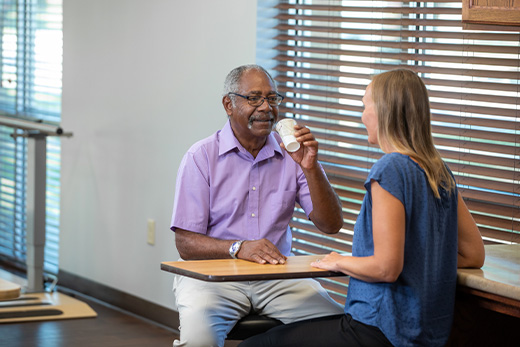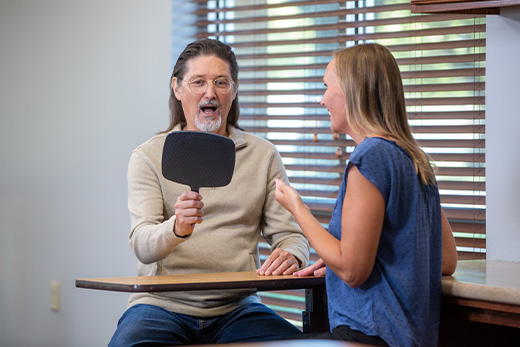Speech Therapy
What is Speech Therapy?
Speech therapy is one of the three main types of rehabilitation therapy. It helps people regain important communication skills. Speech therapy can be completed as an inpatient or outpatient therapy program.

Benefits of Speech Therapy
Personalized treatment programs allow people to regain skills and learn new strategies for understanding, communicating, thinking, problem solving and swallowing safely. All of which can help them stay socially active and independent.
Specifically, speech-language pathologists can help people with speaking, voice, language comprehension, reading, writing, fluency and augmentative communication. They can also help people improve deficits in swallowing that impact their ability to enjoy a regular diet and typical liquids.
They can also help with aspects of cognition, including memory, attention, executive functions, sequencing and planning.
Find a location near you or call us at (855) 918-1262 to learn more about our speech therapy programs.

Common Speech Disorders
Speech-language pathologists help those who have experienced a stroke, brain injury, cancer, progressive neurological disease, early cognitive decline, vocal pathology, or side effects from medication.
Specific issues that speech-language pathologists treat include:
- Augmentative communication needs
- Articulation disorders
- Cognitive-communication disorders
- Expressive disorders
- Fluency disorders
- Receptive language disorders
- Slow or slurred speech
- Swallowing difficulties
- Voice and resonance disorders
Read more about why speech therapy is a crucial part of recovery.

Techniques and Approaches in Speech Therapy
Speech therapists use a variety of methods to help people, including:
- Biofeedback or SeMG
- LSVT Loud
- McNeil Dysphagia Therapy Program
- Melodic Intonation Therapy
- Neuromuscular electrical stimulation
- Oral motor exercises
- Phonological processing
- Progressive cognitive retraining exercises
- Speak with INTENT
- Targeted swallowing exercises such as the Masako, Mendelsohn maneuver, Shaker, Supraglottic maneuver or Effortful swallow
- Vocal function exercises such as Easy Onset, Laryngeal glides or others
- And many others

Choosing the right speech therapist near you
Your speech therapist should provide personalized treatment to meet your needs, using a whole-person approach to caring for the body, mind and soul.
Choose a location that makes you feel comfortable, supported and encouraged. Convenience and safety are also important factors to consider. Read more about how to choose the right rehabilitation program.

Find a Good Samaritan Society location
Connect with Us
